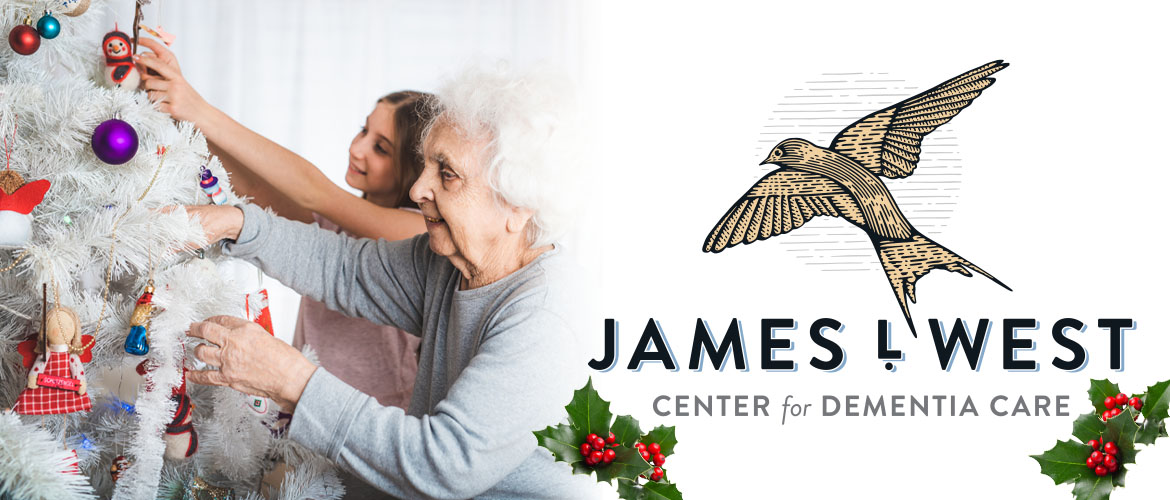Everyone wants to make the most of holiday family time. When your loved one is living with dementia, the holidays present a whole new set of challenges. The disruption of routines can create opportunities for challenging expressions.
Being prepared, setting realistic expectations and saying no can help caregivers navigate the holiday season and find joy in celebrating the holidays with their loved one living with dementia.
Every year, the holidays will be different as your loved one progresses through the different stages of the disease.
“You haven’t been here before, so you must work hard to understand where they are and how best to accommodate them,” says Hollie Glover, director of education and family support services at James L. West Center for Dementia Care. “We accommodate the disease because they can’t accommodate it.”
James L. West’s education team offers a free caregiver training session on dementia and the holidays each year, posting the recording online to make it accessible to caregivers any time.
Preparing friends and family
Caregivers and other family members who spend more time with their loved one with dementia should prepare visitors and family members who may be traveling in for the holidays.
Let them know what to expect. Tell them clearly how your loved one has changed emotionally, mentally and physically.
Before the visit, share basic communication strategies and ways that you manage challenging behaviors or expressions.
“We never want to use the word ‘remember’ around somebody with dementia because we’re just reminding them that they forgot, and that can cause a challenging expression,” Glover says.
Be in the moment with them instead of arguing. Say “okay,” even when it isn’t right.
“We meet our loved ones where they are,” says Glover. “Do not try to bring them into our reality or reason with them.”
If they’re convinced someone did something wrong, try to reassure them that you are on top of the situation and are fixing it. Call someone and go through the process of reporting the problem.
Use distraction tactics. Use food, music or a favorite activity.
It’s also important to share what time of day your loved one is at their best. If your loved one experiences sundowning, suggest visits or celebrations earlier in the day.
Recognize that some of the changes may be difficult for family or friends to deal with. They may be nervous and not know what to say or be afraid to be left alone with the loved one.
Stay close so they can ask questions or you can intervene to avoid challenging behavior or answer any questions.
Getting ready for the holidays
When your loved one is living with dementia, it’s best to keep the celebration simple. Too much stimulation can be overwhelming, causing big emotions and challenging expressions.
The stimulus of the holidays – decorations, parties, extra people, presents – can quickly become overwhelming and may cause your loved one to respond in more challenging ways.
“Remember, what worked last year, likely won’t work this year,” says Glover.
She suggests finding ways to include your loved one in the preparations for the celebrations with simple tasks that can be easily modified for different skill levels.
“It doesn’t have to be perfect,” Glover says. “Let them help and feel useful.”
Some simple activities Glover suggests include:
- Hanging ornaments on the Christmas tree
- Setting the table for dinner
- Stirring batter and mixes in the kitchen
- Putting bows on gifts
- Sealing or making Christmas cards
You can also attend or watch religious services together or watch a favorite holiday movie.
Go for walks with family members to burn off those extra holiday meal calories. Take a drive to look at Christmas lights.
Reminisce about childhood holidays or talk about favorite gifts from years past.
Be realistic in your expectations, and you’ll both find joy in celebrating the holidays.
Making the most of holiday family time
Keep your celebration plans simple. Give yourself time to rest, and allow others to help you.
“Have a plan B,” Glover says. “Many times things won’t go as planned, so have a back-up plan.”
Be realistic in your expectations and planning. Holiday traditions will change as your loved one’s needs and abilities change. Respect your loved one. Be flexible, and be honest with your family about what your loved one can and can’t do.
Keep in mind that holidays can also be a time of grief for you as a caregiver as you remember past holidays and look toward what holidays will look like in the future.
“Try to be in the here and now and give yourself time to grieve and take care of your physical and emotional needs as a caregiver,” Glover says.
Celebrating the holidays after a move to a community
If your loved one is living in a community, carefully consider whether you will celebrate in their new home or if you’ll bring them home for the festivities.
If you decide to celebrate in your loved one’s new home, take advantage of the different areas available in the community. Just as you would move around your home during the celebrations, you should spend time in common areas or go outdoors.
Plan to participate in any planned holiday events with your loved one so they are in their comfort zone.
If you bring your loved one home for the holiday, you’ll need to adjust your expectations to accommodate their needs.
Plan for a smaller gathering to keep from overwhelming your loved one. Involve them in the preparations throughout the day with simple tasks that are safe for them to do.
Stay as close to their regular schedule as possible. Changing the routine can create anxiety and induce challenging expressions.
Encourage your loved one to rest as needed in a quiet place if possible.
The keys to making the most of holiday family time are being realistic, flexible and being in tune to your loved one’s needs.

